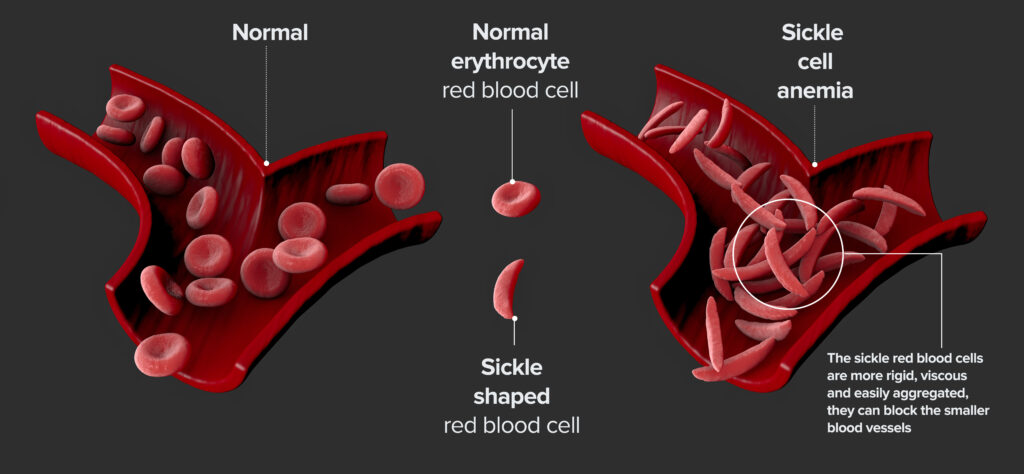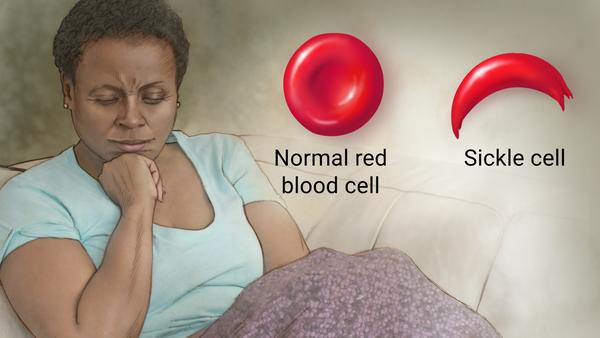SICKLE CELL DISEASE
Treatment advances bring hope to those with SCD
With proper treatment and support people with SCD can live full and enjoyable lives.


Upcoming Event - Blood Drive
Become a Hero for Life!
Join GRAAHI and the esteemed Delta Sigma Theta Sorority in honoring the legacies of Dr. Martin Luther King Jr. and Dr. Charles Drew with a special blood drive.
When: Saturday, January 18th
Location: GRPS University Preparatory Academy
This is your opportunity to make a significant impact on the lives of others. Blood donations are vital, especially for individuals with sickle cell disease.
WHAT IS SICKLE CELL DISEASE?
Inherited red blood cell disorders
Red blood cells contain hemoglobin, a protein that carries oxygen. Healthy red blood cells are round and move through small blood vessels to carry oxygen to all body parts.
Abnormal hemoglobin
In someone who has SCD, the hemoglobin is abnormal, which causes the red blood cells to become hard and sticky and look like a C-shaped farm tool called a “sickle.” The sickle cells die early, which causes a constant shortage of red blood cells.
Clogged blood flow
When sickle cells travel through small blood vessels, they get stuck and clog the blood flow. This can cause pain and other serious complications such as infection, acute chest syndrome, and stroke.

DIAGNOSIS
Sickle cell anemia is diagnosed through blood testing. A blood test will demonstrate the following situations:
- Your hemoglobin is normal.
- You have sickle cell anemia or another sickle cell disease.
- You have sickle cell trait (meaning you are a carrier for the disease).
- Sickle cell disease can be identified before birth by testing a sample of amniotic fluid or tissue from the placenta.
- Early diagnosis is important to better prevent complications.
SYMPTOMS
Possible symptoms include:
- Skin that’s paler than normal
- Yellowish skin, eyes, or mouth (jaundice)
- Difficulty concentrating
- Shortness of breath, especially during exercise
- Dark-colored urine
- Fever
- Weakness
- Dizziness
- Confusion
- Inability to handle physical activity
- Enlarged spleen and liver
- Increased heart rate
- Heart murmur
The CDC states that SCD occurs in 1 of every 365 Black Americans. The disease occurs in 1 of every 16,300 Hispanic Americans.
According to the American Society of Hematology, the condition also affects people of Middle Eastern, Asian, Indian, and Mediterranean descent.
CAN SCD BE PREVENTED?
Sickle cell anemia is an inherited blood disorder. Because it’s a genetic condition someone is born with, there is no way to prevent the disease, so scientists are constantly investigating ways that the disease can be stopped before it passes to the next generation.
The only cure for sickle cell disease is a bone marrow or stem cell transplant.
A child gets sickle cell disease (SCD) when he or she receives two sickle cell genes, one from each parent.
COMPLICATIONS
Sickle cell anemia can lead to a host of complications, including:
- Stroke. Sickle cells can block blood flow to an area of the brain. Signs of stroke include seizures, weakness or numbness of the arms and legs, sudden speech difficulties, and loss of consciousness. If your child has any of these signs and symptoms, seek medical treatment immediately. A stroke can be fatal.
- Acute chest syndrome. A lung infection or sickle cells blocking blood vessels in the lungs can cause this life-threatening complication, resulting in chest pain, fever and difficulty breathing. It might require emergency medical treatment.
- Pulmonary hypertension. People with sickle cell anemia can develop high blood pressure in their lungs. This complication usually affects adults. Shortness of breath and fatigue are common symptoms of this condition, which can be fatal.
- Organ damage. Sickle cells that block blood flow to organs deprive the affected organs of blood and oxygen. In sickle cell anemia, blood is also chronically low in oxygen. This lack of oxygen-rich blood can damage nerves and organs, including kidneys, liver and spleen, and can be fatal.
- Splenic sequestration. A large number of sickle cells can get trapped in the spleen, causing it to enlarge and possibly causing belly pain on the left side of the body. This can be life-threatening. Parents of children with sickle cell anemia should learn to regularly feel their child’s spleen for enlargement.
- Blindness. Sickle cells can block tiny blood vessels that supply the eyes. Over time, this can lead to blindness.
- Leg ulcers. Sickle cell anemia can cause painful open sores on the legs.
- Gallstones. The breakdown of red blood cells produces a substance called bilirubin. A high level of bilirubin in the body can lead to gallstones.
- Priapism. In this condition, men with sickle cell anemia can have painful, long-lasting erections. Sickle cells can block the blood vessels in the penis, which can lead to impotence over time.
- Deep vein thrombosis. Sickling of red cells can cause blood clots, increasing the risk of a clot lodging in a deep vein (deep vein thrombosis) or a lung (pulmonary embolism). Either can cause serious illness or even death.

WHATS NEXT?

I HAVE A SCD DIAGNOSIS
Explore more about SCD, including healthy lifestyle tips to keep you feeling well. Get recipes and exercise routines along with helpful resources for further support.

I'M A CAREGIVER FOR SOMEONE WITH SCD
Caring for a loved one with SCD can be daunting, but there is much you can do to help your loved one lead a fulfilling life.

I CARRY THE SICKLE CELL TRAIT
Whether understanding more about genetic testing, or how carrying the trait impacts family planning, there are resources to help guide you on your journey.

